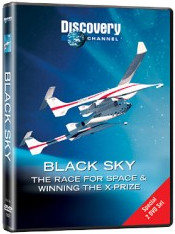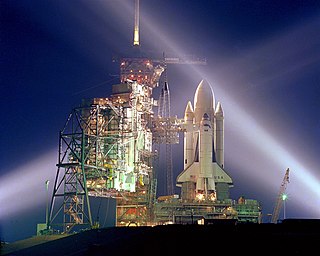
Dennis Anthony Tito is an American engineer and entrepreneur. In mid-2001, he became the first space tourist to fund his own trip into space, when he spent nearly eight days in orbit as a crew member of ISS EP-1, a visiting mission to the International Space Station. This mission was launched by the spacecraft Soyuz TM-32, and was landed by Soyuz TM-31.

Ronnie Walter Cunningham was an American astronaut, fighter pilot, physicist, entrepreneur, venture capitalist, and author of the 1977 book The All-American Boys. NASA's third civilian astronaut, he was a lunar module pilot on the Apollo 7 mission in 1968.

Soyuz TM-30, also known as Mir EO-28, was a Soyuz mission, the 39th and final human spaceflight to the Mir space station. The crew of the mission was sent by MirCorp, a privately funded company, to reactivate and repair the station. The crew also resupplied the station and boosted the station to an orbit with a low point (perigee) of 360 and a high point (apogee) of 378 kilometers ; the boost in the station's orbit was done by utilizing the engines of the Progress M1-1 and M1-2 spacecraft. At that time a transit between Mir and the International Space Station was already impossible - such a transfer was deemed undesired by NASA - and the orbital plane of ISS had been chosen some time before to be around 120 degrees away from that of Mir. The mission was the first privately funded mission to a space station.

Aliens of the Deep is a 2005 American documentary film directed in part by James Cameron alongside fellow cameraman and friend Steven Quale, and filmed in the IMAX 3D format. It was produced by Walden Media and Walt Disney Pictures. Cameron teams with NASA scientists to explore the mid-ocean ridges, submerged chains of mountains in the Atlantic and Pacific oceans that are home to some of the planet's more unusual forms of life.
Walter C. Anderson is an American entrepreneur, investor, and advocate for commercial space travel. He began his career in telecommunications and founded several companies including Mid-Atlantic Telecom in 1984 and Esprit Telecom in 1992, which were acquired by Frontier Communications and Global TeleSystems Group, respectively. He co-founded the International Space University and provided financial support for the Space Frontier Foundation during its creation. Anderson also invested in a number of space ventures including Rotary Rocket, a company that attempted to develop a reusable, single-stage launch vehicle with the aid of helicopter rotors. He founded MirCorp, an unsuccessful venture to privatize the Mir space station, and Orbital Recovery Corporation, a company developing technology to capture and repair telecommunication satellites.
Rick Tumlinson is the co-founder of several space companies and non-profits including Deep Space Industries, Orbital Outfitters, the New Worlds Institute, and the Space Frontier Foundation. He is an active space entrepreneur and space activist. He has testified on space-related topics before the U.S. Congress six times since 1995. In 2004, Space News magazine listed Tumlinson as one of the 100 most influential people in the space industry, stating:
Part agitator, part operator, Tumlinson has spent the past two decades advocating human exploration and settlement of the solar system and has been a strong advocate of creating commercial opportunities at the Russian Mir space station and at the international space station.

PlanetSpace was a privately funded Chicago-based rocket and space travel project founded by Geoff Sheerin, CEO of the Canadian Arrow corporation. The owner was Dr. Chirinjeev Kathuria.

Jeffrey Manber is regarded as one of the pioneering commercial space entrepreneurs. As CEO of NanoRacks, from 2009, Manber has steered the growth of the first company to own and market its own hardware and services on board the International Space Station. Manber has been involved in several of the key breakthrough commercial space projects, principally those revolving around the commercialization of space assets as well as the integration of the Russian space industry into major space programs, including that of the International Space Station. Manber is believed to be the only American to be an official part of the Russian space corporation, RSC Energia, during their privatization period of the 1990s.

Robert A. Citron, often called Bob Citron was an American entrepreneur and aerospace engineer who was born in Brooklyn, New York, and educated at the University of the Philippines and aeronautical engineering from Northrop University (1953–1959). Citron helped establish and manage the Smithsonian Astrophysical Observatory’s Operation Moonwatch and Precision Optical Satellite Tracking Programs (STP) after the launch of Sputnik I in 1957. He founded or co-founded five companies dealing with documentary film production, publishing, space research and space logistics support, reusable satellite launch systems, and Lunar transportation and logistics. Citron also started three nonprofit foundations dealing with scientific field research. He died on January 31, 2012, at his home in Bellevue, Washington, at the age of 79, due to complications from prostate cancer.
Apogee Books is an imprint of Canadian publishing house Collector's Guide Publishing. The Apogee imprint began with "Apollo 8 The NASA Mission Reports" in November 1998 at the request of astronaut Buzz Aldrin, second man on the moon. The first publication by Apogee was printed to celebrate the 30th anniversary of the first crewed flight around the moon. A limited edition print run of this Apollo 8 book led to Aldrin suggesting that the imprint continue with further anniversary publications.

Established in 1998, ECTA is the leading pan-European telecoms association promoting market liberalisation and competition in the European communications sector, fostering ‘competition and open access’ and developing policy by representing ‘new entrant’ interests to European institutions and Government bodies. ECTA seeks to create confidence for investors through clear and consistent regulation to unlock the growth potential of Europe’s businesses.

Blue Planet is a 1990 IMAX film directed by Ben Burtt, and produced by the IMAX Space Technology corporation for the Smithsonian Institution's National Air and Space Museum, as well as Lockheed Corporation. Filmed with the cooperation of the NASA, it was written, edited, and narrated by Toni Myers.
James Lawson Neihouse is an American cinematographer who has been involved with many of the most memorable and successful IMAX 2D and IMAX 3D films to date.
Mission to Mir is a 1997 documentary film about the Mir Space Station.

The International Institute of Space Commerce (IISC) was established at the Isle of Man in 2007 as a corporation between the International Space University (ISU) and the Government of the Isle of Man. Realizing that the new space economy is being confronted with new challenges, it was felt necessary to establish a new think-tank focusing on commercial space aspects in addition to other space think-tanks, most of them with an emphasis on governmental space activities.

Black Sky: The Race For Space is a 2004 Discovery Channel documentary about Space Ship One, and how a small team backed by Paul Allen achieved human suborbital spaceflight and won the Ansari X Prize. It contains insights about how the rocketplane was built, the challenges they faced when they flew it, the vision of Burt Rutan about the future of this technology, and his thoughts about NASA and government. It won a Peabody Award in 2004.
Michael Potter is an entrepreneur, documentary filmmaker, author, and social enterprise investor.

A Beautiful Planet is a 2016 American documentary film directed, written, and produced by Toni Myers, and narrated by actress Jennifer Lawrence. It was originally released exclusively for IMAX theatres. Created in cooperation with the National Aeronautics and Space Administration (NASA), the documentary utilizes footage recorded by astronauts aboard the International Space Station (ISS) over the course of fifteen months. The documentary examines how astronauts live and work on a daily basis. The astronauts are representing the respective space agencies of the United States, Russia, Europe, and Japan.

Apollo 11 is a 2019 American documentary film edited, produced and directed by Todd Douglas Miller. It focuses on the 1969 Apollo 11 mission, the first spaceflight from which men walked on the Moon. The film consists solely of archival footage, including 70 mm film previously unreleased to the public, and does not feature narration, interviews or modern recreations. The Saturn V rocket, Apollo crew consisting of Buzz Aldrin, Neil Armstrong, and Michael Collins, and Apollo program Earth-based mission operations engineers are prominently featured in the film.

Hail Columbia is a 1982 American IMAX documentary film about NASA's Space Shuttle program, particularly the first Space Shuttle, Columbia. The film was directed by Graeme Ferguson.














